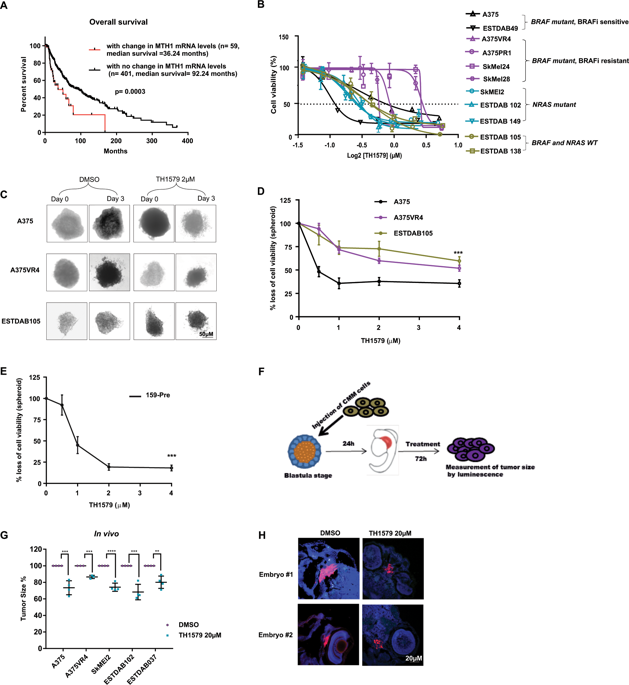当前位置:
X-MOL 学术
›
Cell Death Differ.
›
论文详情
Our official English website, www.x-mol.net, welcomes your
feedback! (Note: you will need to create a separate account there.)
AXL and CAV-1 play a role for MTH1 inhibitor TH1579 sensitivity in cutaneous malignant melanoma.
Cell Death and Differentiation ( IF 13.7 ) Pub Date : 2020-01-09 , DOI: 10.1038/s41418-019-0488-1 Ishani Das 1 , Helge Gad 2, 3 , Lars Bräutigam 2 , Linda Pudelko 2 , Rainer Tuominen 1 , Veronica Höiom 1 , Ingrid Almlöf 2 , Varshni Rajagopal 2 , Johan Hansson 1, 4 , Thomas Helleday 2, 3 , Suzanne Egyházi Brage 1 , Ulrika Warpman Berglund 2
Cell Death and Differentiation ( IF 13.7 ) Pub Date : 2020-01-09 , DOI: 10.1038/s41418-019-0488-1 Ishani Das 1 , Helge Gad 2, 3 , Lars Bräutigam 2 , Linda Pudelko 2 , Rainer Tuominen 1 , Veronica Höiom 1 , Ingrid Almlöf 2 , Varshni Rajagopal 2 , Johan Hansson 1, 4 , Thomas Helleday 2, 3 , Suzanne Egyházi Brage 1 , Ulrika Warpman Berglund 2
Affiliation

|
Cutaneous malignant melanoma (CMM) is the deadliest form of skin cancer and clinically challenging due to its propensity to develop therapy resistance. Reactive oxygen species (ROS) can induce DNA damage and play a significant role in CMM. MTH1 protein protects from ROS damage and is often overexpressed in different cancer types including CMM. Herein, we report that MTH1 inhibitor TH1579 induced ROS levels, increased DNA damage responses, caused mitotic arrest and suppressed CMM proliferation leading to cell death both in vitro and in an in vivo xenograft CMM zebrafish disease model. TH1579 was more potent in abrogating cell proliferation and inducing cell death in a heterogeneous co-culture setting when compared with CMM standard treatments, vemurafenib or trametinib, showing its broad anticancer activity. Silencing MTH1 alone exhibited similar cytotoxic effects with concomitant induction of mitotic arrest and ROS induction culminating in cell death in most CMM cell lines tested, further emphasizing the importance of MTH1 in CMM cells. Furthermore, overexpression of receptor tyrosine kinase AXL, previously demonstrated to contribute to BRAF inhibitor resistance, sensitized BRAF mutant and BRAF/NRAS wildtype CMM cells to TH1579. AXL overexpression culminated in increased ROS levels in CMM cells. Moreover, silencing of a protein that has shown opposing effects on cell proliferation, CAV-1, decreased sensitivity to TH1579 in a BRAF inhibitor resistant cell line. AXL-MTH1 and CAV-1-MTH1 mRNA expressions were correlated as seen in CMM clinical samples. Finally, TH1579 in combination with BRAF inhibitor exhibited a more potent cell killing effect in BRAF mutant cells both in vitro and in vivo. In summary, we show that TH1579-mediated efficacy is independent of BRAF/NRAS mutational status but dependent on the expression of AXL and CAV-1.
中文翻译:

AXL 和 CAV-1 在皮肤恶性黑色素瘤中对 MTH1 抑制剂 TH1579 敏感性发挥作用。
皮肤恶性黑色素瘤(CMM)是最致命的皮肤癌,由于其容易产生治疗耐药性,因此在临床上具有挑战性。活性氧 (ROS) 可诱导 DNA 损伤,并在 CMM 中发挥重要作用。 MTH1 蛋白可防止 ROS 损伤,并且通常在包括 CMM 在内的不同癌症类型中过度表达。在此,我们报告 MTH1 抑制剂 TH1579 诱导 ROS 水平,增加 DNA 损伤反应,引起有丝分裂停滞并抑制 CMM 增殖,导致体外和体内异种移植 CMM 斑马鱼疾病模型中的细胞死亡。与 CMM 标准治疗、维莫非尼或曲美替尼相比,TH1579 在异质共培养环境中更有效地消除细胞增殖和诱导细胞死亡,显示出其广泛的抗癌活性。在大多数测试的 CMM 细胞系中,单独沉默 MTH1 表现出类似的细胞毒性作用,同时诱导有丝分裂停滞和 ROS 诱导,最终导致细胞死亡,进一步强调了 MTH1 在 CMM 细胞中的重要性。此外,先前已证明受体酪氨酸激酶 AXL 的过度表达有助于 BRAF 抑制剂耐药性,使 BRAF 突变体和 BRAF/NRAS 野生型 CMM 细胞对 TH1579 敏感。 AXL 过度表达最终导致 CMM 细胞中 ROS 水平升高。此外,对细胞增殖显示出相反作用的蛋白质 CAV-1 的沉默会降低 BRAF 抑制剂耐药细胞系对 TH1579 的敏感性。正如 CMM 临床样本中所见,AXL-MTH1 和 CAV-1-MTH1 mRNA 表达相关。最后,TH1579与BRAF抑制剂组合在体外和体内对BRAF突变细胞表现出更有效的细胞杀伤作用。 总之,我们表明 TH1579 介导的功效与 BRAF/NRAS 突变状态无关,但依赖于 AXL 和 CAV-1 的表达。
更新日期:2020-01-10
中文翻译:

AXL 和 CAV-1 在皮肤恶性黑色素瘤中对 MTH1 抑制剂 TH1579 敏感性发挥作用。
皮肤恶性黑色素瘤(CMM)是最致命的皮肤癌,由于其容易产生治疗耐药性,因此在临床上具有挑战性。活性氧 (ROS) 可诱导 DNA 损伤,并在 CMM 中发挥重要作用。 MTH1 蛋白可防止 ROS 损伤,并且通常在包括 CMM 在内的不同癌症类型中过度表达。在此,我们报告 MTH1 抑制剂 TH1579 诱导 ROS 水平,增加 DNA 损伤反应,引起有丝分裂停滞并抑制 CMM 增殖,导致体外和体内异种移植 CMM 斑马鱼疾病模型中的细胞死亡。与 CMM 标准治疗、维莫非尼或曲美替尼相比,TH1579 在异质共培养环境中更有效地消除细胞增殖和诱导细胞死亡,显示出其广泛的抗癌活性。在大多数测试的 CMM 细胞系中,单独沉默 MTH1 表现出类似的细胞毒性作用,同时诱导有丝分裂停滞和 ROS 诱导,最终导致细胞死亡,进一步强调了 MTH1 在 CMM 细胞中的重要性。此外,先前已证明受体酪氨酸激酶 AXL 的过度表达有助于 BRAF 抑制剂耐药性,使 BRAF 突变体和 BRAF/NRAS 野生型 CMM 细胞对 TH1579 敏感。 AXL 过度表达最终导致 CMM 细胞中 ROS 水平升高。此外,对细胞增殖显示出相反作用的蛋白质 CAV-1 的沉默会降低 BRAF 抑制剂耐药细胞系对 TH1579 的敏感性。正如 CMM 临床样本中所见,AXL-MTH1 和 CAV-1-MTH1 mRNA 表达相关。最后,TH1579与BRAF抑制剂组合在体外和体内对BRAF突变细胞表现出更有效的细胞杀伤作用。 总之,我们表明 TH1579 介导的功效与 BRAF/NRAS 突变状态无关,但依赖于 AXL 和 CAV-1 的表达。











































 京公网安备 11010802027423号
京公网安备 11010802027423号